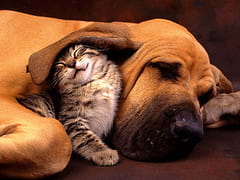Pet ownership and personality
opp

To what extent is our choice of pet, or indeed whether or not we choose to have a pet, governed by our personality?
Within our sample of 1,212 respondents, which was representative of the UK and Ireland general population, 59% reported owning a pet, with:
- 32% owning a dog
- 27% owning a cat
- 10% owning BOTH a dog and a cat
Across all pet categories, women were the more likely gender to own the pet (with the exception of birds; 66% of bird owners were men). Now, we recognise that often the choice of pet ownership is not entirely our own, with the under 19s being the most likely group to own rodents and rabbits – along with their parents (the 35-49 year olds). However, is there some truth in the perceived wisdom that dog owners and cat owners are different from one another?
When we looked at the types of work that would appeal to dog and cat owners we found some significant differences:
- Dog owners reported that jobs in a nurturing and caring profession were appealing to them, whereas working in a highly structured environment, dealing with facts, figures and organising information was less appealing.
- Cat owners reported finding work involving self-expressive behaviour appealing, eg art, music, design, writing, acting and composing.
This appears to conform to stereotype, so maybe there is something in it… These work preferences were supported by the differences in personality traits that we found:
- Dog owners: More likely to have a warmer and more open personality and attitude towards others, in comparison to other pet owners or non-pet owners. They are likely to show a higher degree of interest in social contact and in helping others, compared to other pet owners. They may also be more expressive and enthusiastic, and may enjoy variety, excitement and spontaneity more than other pet owners.
- Cat owners: May adopt a more considered and cautious approach towards making decisions and life in general, in comparison with other pet owners. They may be less keen, in comparison to other pet owners and non-pet owners, on becoming the centre of attention in social groups. Instead they may be more comfortable in smaller social groups, eg with a few close friends. They may enjoy the freedom to make their own decisions and choices independently of a team or social group. They may possess a more abstract thinking style, in comparison to other pet owners and non-pet owners. They may show a preference for taking a broader ‘big picture’ approach to decision-making, showing more interest in theories, concepts and future possibilities rather than the practical details. Correspondingly, they may be more open to new ideas and approaches, and may enjoy experimenting with new and different solutions to problems. Finally, they may be more interpersonally and artistically sensitive than other pet owners or non-pet owners. They are likely to be considerate and concerned about others’ feelings and reactions when making decisions.
- Non-pet owners: May show a preference towards a more grounded, practical, and down to earth style, in comparison to pet owners (particularly those owning cats). They may show a preference for taking action rather than theorising about future possibilities. Similarly, they may show a preference for decision-making based on logic and tangible details, rather than more subjective considerations, valuing realistic and practical solutions to problems.
So maybe pet owners do resemble their pets? However, despite the temptation, it’s probably best not to start asking interview questions such as “Do you own a dog?”.